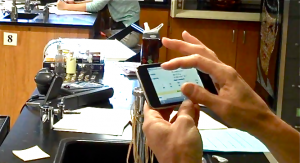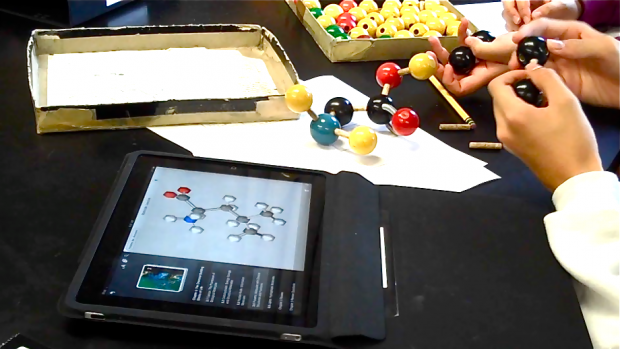The district began piloting the mobile devices last year and like a lot of districts, is in the process of figuring out what works best under individual circumstances. A ninth-grade English class used the iPad to study Dr. Jekyll and Mr. Hyde, and a science teacher is trying out Inkling, the interactive textbook app for iPads. [We'll hear more from English teacher Liz Pagano later this week.]

As with every new technology, teacher training is key in order to maximize the use of the tools. With that in mind, the district holds professional development sessions with teachers to make sure they know how to use iPads and iPod Touches to their full potential.
When it came to choosing which devices to invest in, Davis was mindful of the lightning-speed changes in technology, a common frustration for even the most technologically progressive.
“We have to be careful with our choices,” she said. “Just in the last three years, the speed at which technology is changing has really picked up. In the past, we could try to guarantee that the technology would be usable for the next 5 to 10 years, but you can’t do that anymore. Almost on a daily basis, something new or changing comes up. And it’s not like you can keep using the old ones because the structure that supports it doesn’t work.”
Another important consideration is how to integrate the technology with the role of the teacher in mind. Davis says despite fears that educators' presence will not be necessary in the classroom, teachers are as crucial as ever.
“A good teacher is a good teacher. The added value they bring as our kids move forward in this world, to have experiences with different technologies, is invaluable,” she said. “I’m interested in students being content creators. Can students use technologies in academic ways? We know they can use technologies without us -- they’ve got mobiles, texts, Facebook. They’ve got mobiles, texts, Facebook, and people out in the work world and academic world use technologies all the time. If you have a very engaging science teacher, but no technology there, where will students learn the other part of being a scientist, for example, and how can they add their own content and creativity?”
“You could have a poor teacher with all the best technology in the world, and nothing can happen," she said.



